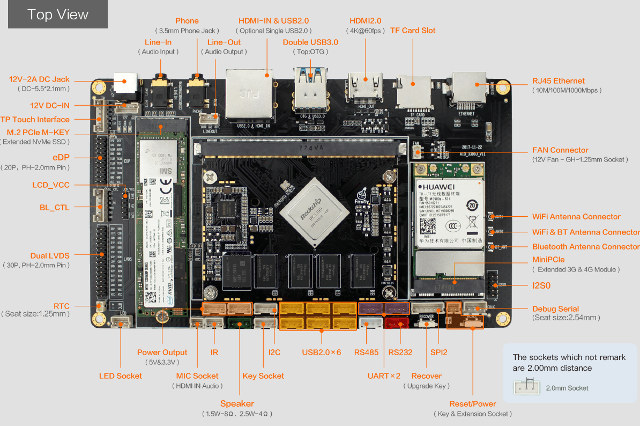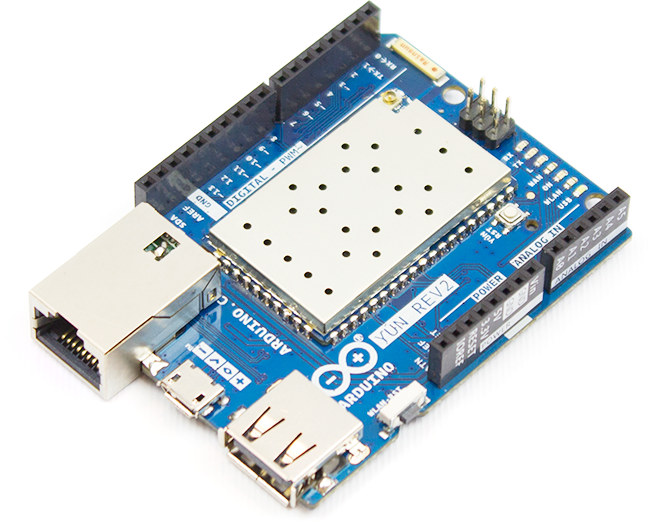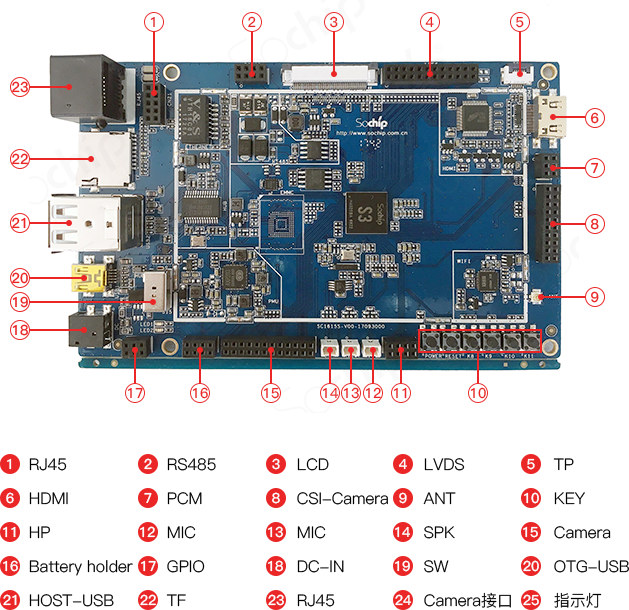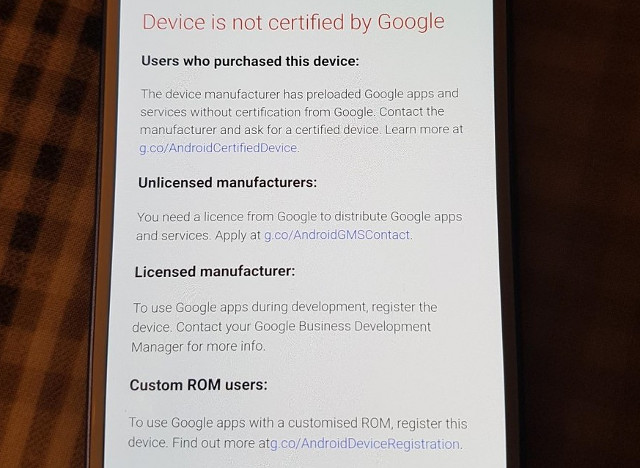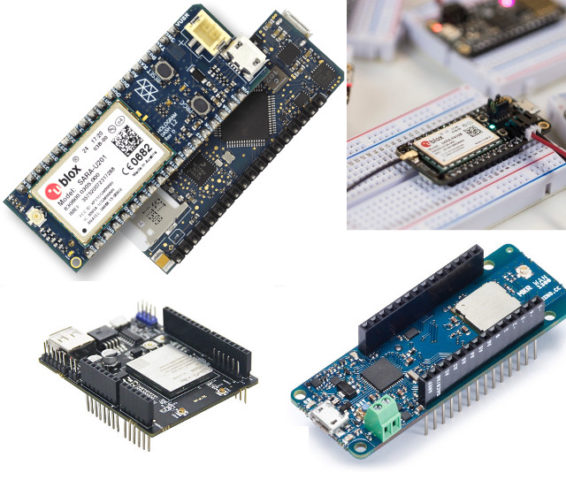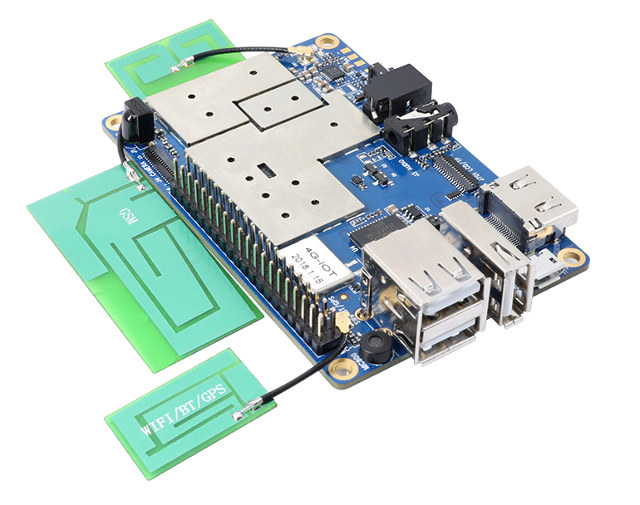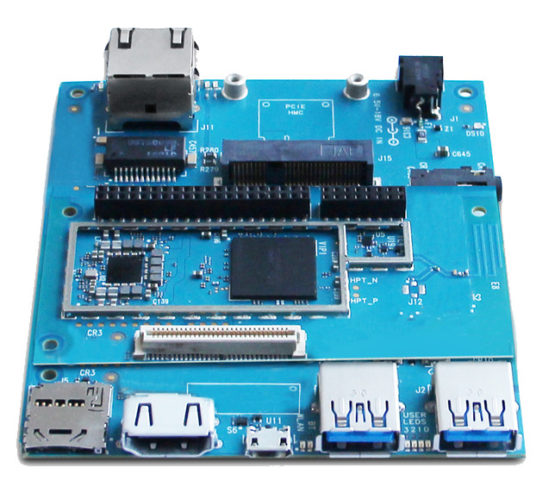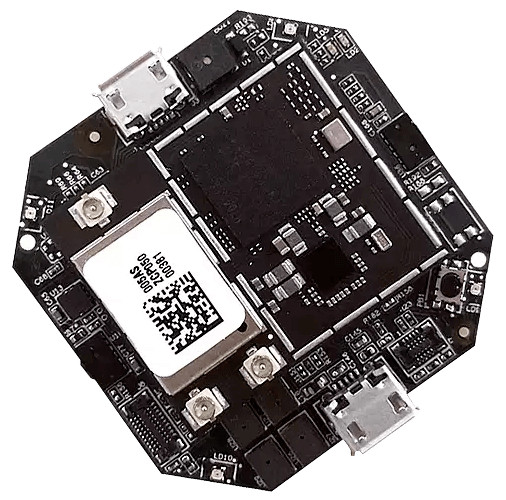Firefly-RK3399 was the very first Rockchip RK3399 development board when it launched in late 2016, and it mostly stayed that way until others joined in late 2017, early 2018 with products like Orange Pi RK3399, ODROID-N1, Rock960, or Pine64 RockPro64 among others. Firefly team has now unveiled another higher end “all-in-board industrial board” with their Firefly AIO-3399J board featuring their RK3399 CoreBoard module, and a baseboard exposing plenty of I/O and connector, including support for M.2 drives, and 4G LTE mini PCIe cards. Firefly AIO-3399J specifications: SoM – RK3399 CoreBoard: SoC – Rockchip RK3399 hexa-core big.LITTLE processor with dual core ARM Cortex A72 up to 2.0 GHz and quad core Cortex A53 processor, ARM Mali-T860 MP4 GPU with OpenGL 1.1 to 3.1 support, OpenVG1.1, OpenCL and DX 11 support System Memory – 2GB or 4GB DDR3-1333 Storage – 16GB eMMC 5.1 flash (other capacities also available on demand up to […]
49 Euros Arduino Yún Rev.2 Unveiled with a Lower Profile, USB and Power Improvements
Arduino Yún board launched in 2013 was the first official Arduino combining Arduino and Linux thanks to respectively an Atmel ATMega32u4 microcontroller, and Atheros AR9331 MIPS WiFi SoC running Linino, a fork of OpenWrt maintained by Arduino. The company has now launched an upgraded version – simply called Arduino Yún Rev.2 – in order to to improve security, support, and open-sourceness of the board. Arduino Yun Rev.2 key specifications have actually not changed: MCU – Microchip ATMega32U4 @ 16 MHz (as used in Leonardo board) with 2.5KB SRAM, 32KB flash, 1KB EEPROM SoC – Atheros AR9331 MIPS-based Wi-Fi SoC coupled with 64MB external DDR2 and 16MB SPI NOR flash Storage – microSD card slot USB – micro USB connector + full USB 2.0 host port Connectivity – Ethernet + Wi-Fi I/Os 20 digital input/output pins (including 7x PWM outputs) 12x analog inputs But the hardware design – this time development […]
Allwinner S3 Dual Camera SoC Includes 128MB RAM, an I2S Audio Interface
Allwinner V3s processor was introduced a little over a year ago with a single Arm Cortex A7 core, 64MB DRAM built-in, and designed for camera applications with parallel CSI and 4-lane MIPI CSI2 interfaces It looks like Allwinner has now launched an updated version with Allwinner S3, still based on Cortex A7, but increasing memory to 128MB, and adding some interfaces like I2S. We don’t have a whole lot of information, apart from a development board (SC1615S) on Taobao with the following (tentative) specifications: SoC – Allwinner / Sochip S3 Cortex-A7 processor with 128MB DDR3 Storage – 16MB NOR Flash, 4GB eMMC flash, SPI NAND flash, micro SD card Display I/F – LCD, LVDS, touch panel connectors, HDMI port Camera I/F – 1x 4-lane MIPI CSI, 1x parallel CSI Audio – HP, 2x MIC, speaker headers, PCM header Connectivity – 10/100M Ethernet, 802.11 b/g/n WiFi + Bluetooth (AP6212 or XR819 […]
Google Has Made it Harder to Load Google Apps on Uncertified Devices
Cheap TV boxes or development boards that can run Android, are not normally certified by Google, but you can still use Google Apps like the Google Play Store either directly with the manufacturer pre-loading the packages on the device, or manually by installing the packages yourself. According to a report by XDA developers, Google has made it harder to load Gapps on uncertified devices starting from March 16th, and if you try to login on a new custom firmware you may get the message “Device is not certified by Google” when accessing a Google app. The change will apparently only affect newly built firmware , so older firmware should still be able to access Google Play store (TBC). We’ll have to see how it turns out. Google Play Services is said to check ro.build.fingerprint for the build date, but it seems too easy to work around this, if that’s the […]
A List of Cellular IoT Development Boards
We’re starting to have a decent choice of cellular development boards, and as the number of products is getting larger having some sort of list would be useful. That’s exactly what Hologram has done. While the list is not quite exhaustive, they’ve pushed the CSV list to Github, and plans to update it. Hologram also encourages pull requests, so manufacturers may consider updating it with their own boards. The list focuses on development boards acting as cellular IoT endpoints, so you won’t find gateways, WiFi hotspots, end-user devices, and modules that needs to be soldered onto your own board. I have imported the list to WordPress to make it searchable, let people select the number of rows to display, and customize visible fields. The table is not automatically synchronized, so for the latest version always check out Github. Jean-Luc Aufranc (CNXSoft)Jean-Luc started CNX Software in 2010 as a part-time endeavor, […]
Orange Pi 4G-IoT Development Board Launched for $45
Last year, Shenzhen Xunlong Software launched Orange Pi 2G-IoT board for just $9.90. Pricing was incredibly aggressive for a cellular board, but AFAIK the RDA Micro processor used in the design had never been used with Linux so for many people using the board was a challenge (and maybe still is), and some countries have already started to sunset 2G networks. So it only made sense for the company to work on a 4G board, and that’s exactly what they have done with Orange Pi 4G-IoT now launched for $45 + shipping on Aliexpress. Orange Pi 4G-IoT specifications: SoC – Mediatek MT6737 quad core Cortex A53 processor @ 1.1/1.3 GHz with Arm Mali-T720MP1 GPU System Memory – 1GB DDR3 Storage – 8GB eMMC flash + micro SD slot Video Output – HDMI, LCD display interface with touch panel support Audio – 3.5mm earphone jack, built-in microphone Cellular Connectivity nano SIM […]
Qualcomm Snapdragon 820E based Geniatech Developer Board 8 Runs Debian, Follows 96Boards CE Extended Form Factor
Qualcomm Snapdragon 820E processor was recently launched a version of Snapdragon 820 without LTE modem, easier to source, and targeting the embedded market. The long expected DragonBoard 820c is the first board to feature the new processor, but Geniatech has also been working on their own Developer Board 8 that follows 96Boards CE Extended form factor, and is very similar to DragonBoard 820c. Developer Board 8 (DB8) specifications: SoC – Qualcomm Snapdragon 820E quad core Kryo processor up to 2.35 GHz with Adreno 530 GPU System Memory – 3 GB LPDDR4-1866 (PoP) Storage – 32 GB UFS Flash + micro SD 3.0 (UHS-I) slot Video Output – HDMI 2.0 up to 4K @ 60 Hz Audio – Via HDMI, 3.5mm audio jack Connectivity – Gigabit Ethernet, 802.11 b/g/n/ac WiFi, Bluetooth 4.2, GPS (TBC) USB – 2x USB 3.0 ports, 1x micro USB 2.0 device port Camera – Support for up […]
RushUp KITRA Board Family is based on Samsung Artik 020, Artik 520/530, or Artik 710 Modules
Samsung first announced their Artik IoT modules almost three years ago, and until recently most Artik related products or development kits came from Samsung themselves, with no third party involved. But this has started to change recently with announcements such a Seeed Studio Eagleye 530s low cost development board based on Artik 530 module, and Resin.io Project Fin combining RPI CM3L module with an Artik 020 module for low power Bluetooth connectivity. But as I flicked through Resin.io supported hardware, I discovered they also supported Linux powered Artik 520 and Artik1020 module, as well as some new “KITRA” boards I had never heard of, and if we visit RushUp company website, we can see they have a bunch of Kutra boards and one IoT gateway based on Artik modules: KITRA 520 – Samsung ARTIK 520 product accelerator for advanced IoT KITRA 710 – Samsung ARTIK 710 product accelerator for advanced multimedia […]


